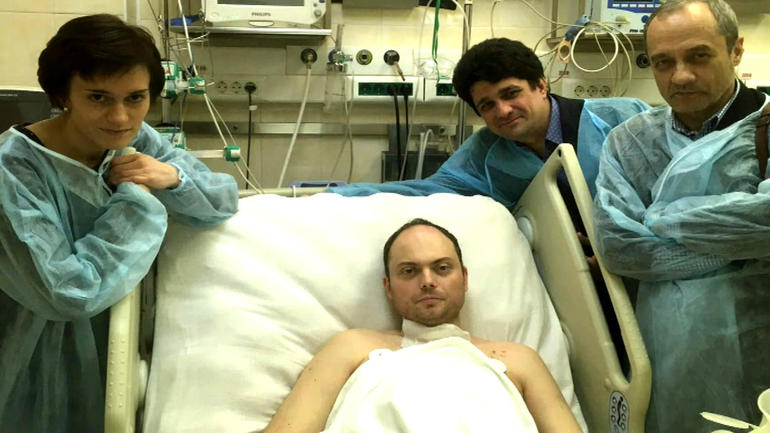6-4-17 

Vladimir Kara-Murza recovering in the hospital after the second alleged poisoning
The 60 Minutes team proceeded with healthy skepticism. It turns out it's not easy to secretly kill a person using poison. The producers cite numerous cases of Russians who were poisoned multiple times before a dose proved fatal.
"What we found is the Russians have been obsessed with poison for centuries, definitely for at least a hundred years," Bar-On says. Russian history and literature is rife with stories of poisonings. "Poison is a very big part of the Russian psyche," Bar-On says. "We've got our love of guns in this country. Russia has its love of poison."
But Kara-Murza cannot say for certain that he was poisoned. "I don't know who or when or how," he says. "The only thing I'm pretty sure about is why."
Kara-Murza is a former Washington-based reporter for a Russian TV station who speaks out against the Russian government on the international stage. "There seems to be a very high mortality rate among people who oppose Mr. Putin or people who engage in independent journalism in Russia," Kara-Murza says. "Why should that be, I wonder?" https://www.cbsnews.com/news/poisoned-again-what-60-minutes-learned-about-russias-love-of-poison/
..........................................................................................................................
5-19-15 Numerous Kremlin opponents and critics have fallen ill from poisoning over the years, sometimes fatally, in circumstances that have raised suspicions of KGB-style assassinations. RFE/RL takes a look at various poisons thought to have been involved in prominent cases.
The most toxic source of Gelsemium poison is Gelsemium elegans, or "heartbreak grass," a rare variety of a plant that only grows in Asia. Lacing food with heartbreak grass is a known method of assassination by Russian and Chinese contract killers.
Aleksandr Perepilichny was a Russian oligarch and Kremlin critic who sought refuge in Britain in 2009 and had been helping a Swiss investigation into a Russian money-laundering scheme by providing evidence against allegedly corrupt officials in Moscow. He also provided evidence against Russian officials linked to the 2009 death of anticorruption lawyer Sergei Magnitsky in a Moscow jail. Shortly before he collapsed and died at the age of 44 while jogging outside his home in Surrey, Perepilichny told his colleagues that he had received death threats.
Although he was the fourth person linked to the Magnitsky case to die in strange circumstances, police in Surrey initially ruled that his death was not suspicious. But on May 18, British authorities reopened an investigation into his 2012 death after new tests discovered traces in his stomach that could only come from the highly toxic Gelsemium plant.https://www.rferl.org/a/exotic-toxins-fell-kremlin-foes/27025621.html
.............................................................................................................................
“We actually had evidence within the last 10 years that Russia has not only been investigating the delivery of nerve agents for the purposes of assassination but has also been creating and stockpiling Novichok,” U.K. Foreign Secretary Boris Johnson said in an interview with BBC TV’s Andrew Marr Show on Sunday. “To the best of our knowledge, this is a Russian-made nerve agent that falls within the category of Novichok, made only by Russia.” Vladimir Chizhov, Russia’s ambassador to the European Union, told the same program that his country has “no stockpiles whatsoever” of nerve agents....“People have all now experienced, whether it’s in America, Germany, France, say nothing of the Baltic countries, the Balkans and Poland, they’ve all experienced Russian meddling. Malign, disruptive Russian behavior over the last few years,” Johnson said. “They can see a country that is going in the wrong direction and that’s why they’re so inclined now not to give Russia the benefit of the doubt and to stand shoulder to shoulder with the U.K.” https://www.bloombergquint.com/politics/2018/03/18/u-k-lab-suggested-as-spy-poison-source-russia-envoy-tells-bbc
................................................................................................................................
3-16-18 A number of analysts have said Mr. Skripal’s activities posed no threat to Russia of note, with many suggesting that the Kremlin’s motivation for the alleged assassination attempt is symbolic in nature.
“The ‘audience’ of this action is in Russia and includes Russian political elites and their families,” to whom the Kremlin wants to show “the risks of disloyalty”, explains Pavel Luzin, an international relations and security analyst with Russian affairs journal Intersection. https://www.theworldweekly.com/reader/view/16049/what-does-russia-make-of-the-skripal-poisoning-scandal
..................]
...........................................................................................................................................
http://www.chicagotribune.com/news/opinion/commentary/ct-putin-kills-enemies-journalists-poison-20170207-story.html 2-7-17 The corrupt and often ruthless system Putin has maintained in Russia is clearly a Kiiller, and not just by dint of empowering people like Kadyrov. Since Putin came to power, 25 journalists were killed for work-related reasons. Many of them had been investigating corruption by Putin-appointed officials or exposing injustice by Putin's billionaire friends — like Mikhail Beketov, the editor of a small paper in the Moscow suburbs that opposed a highway project led by Putin crony Arkady Rotenberg. Only three journalists have been murdered in the U.S. in the same period, and two of them were victims of a terror attack.
No comments:
Post a Comment